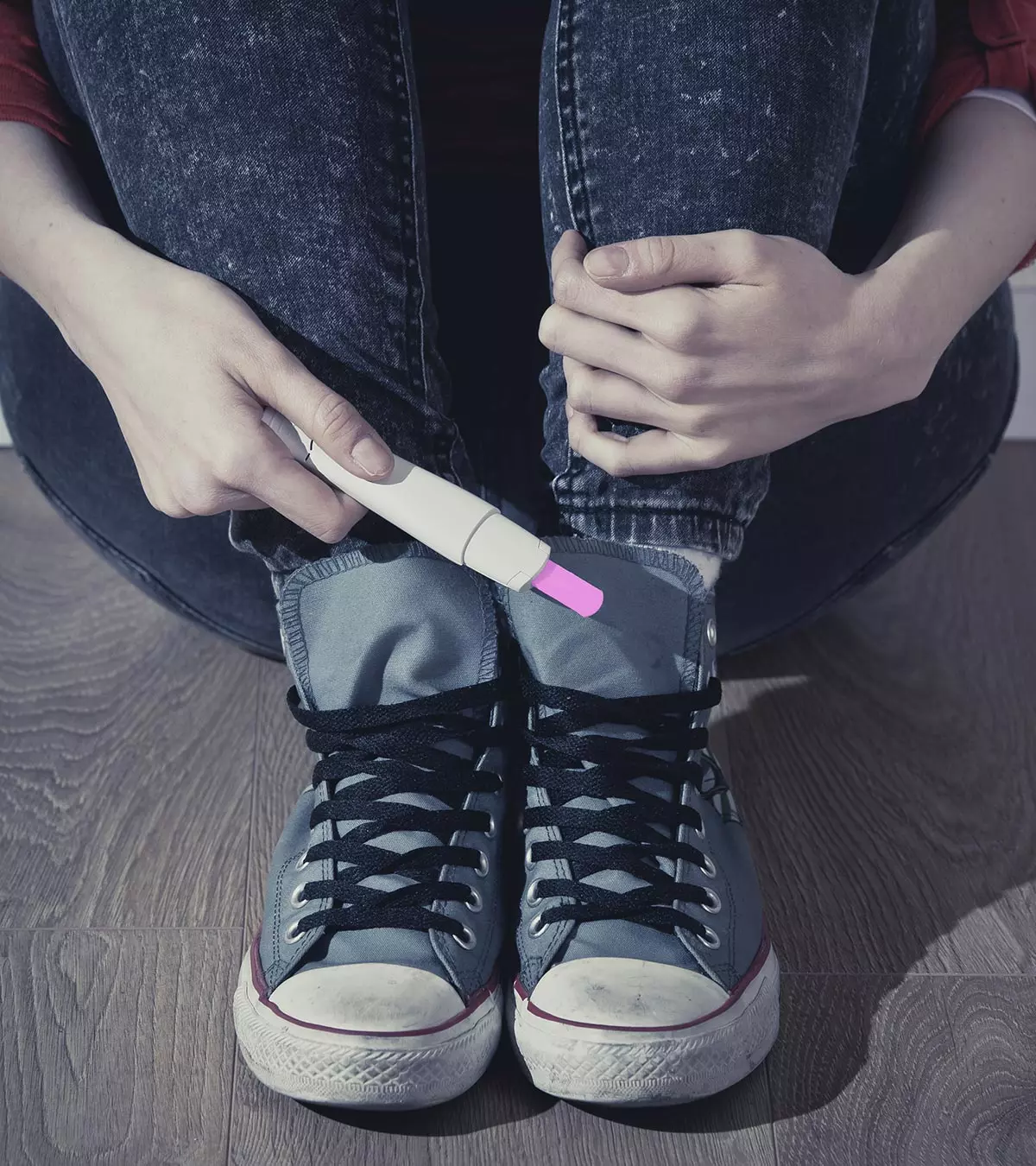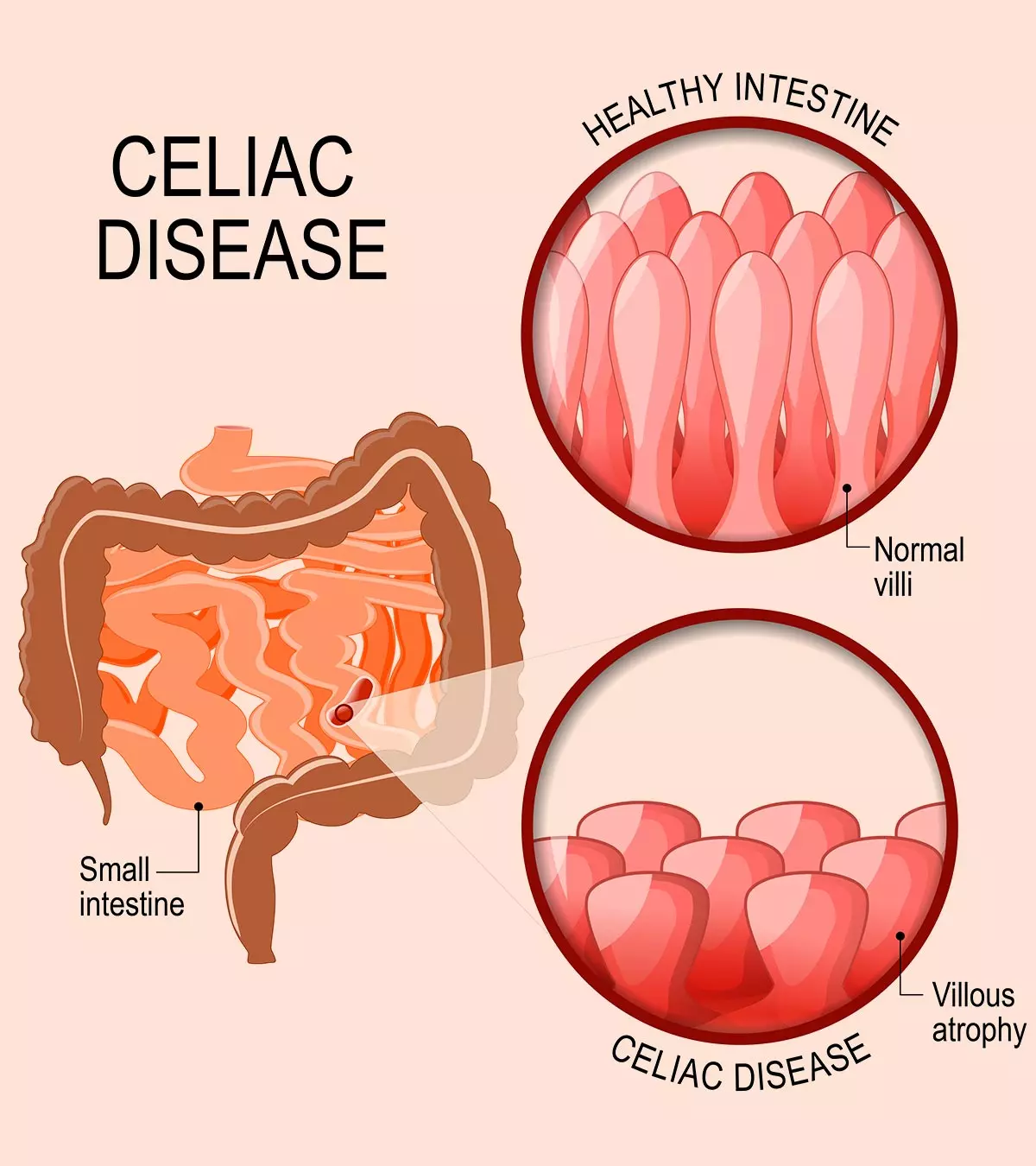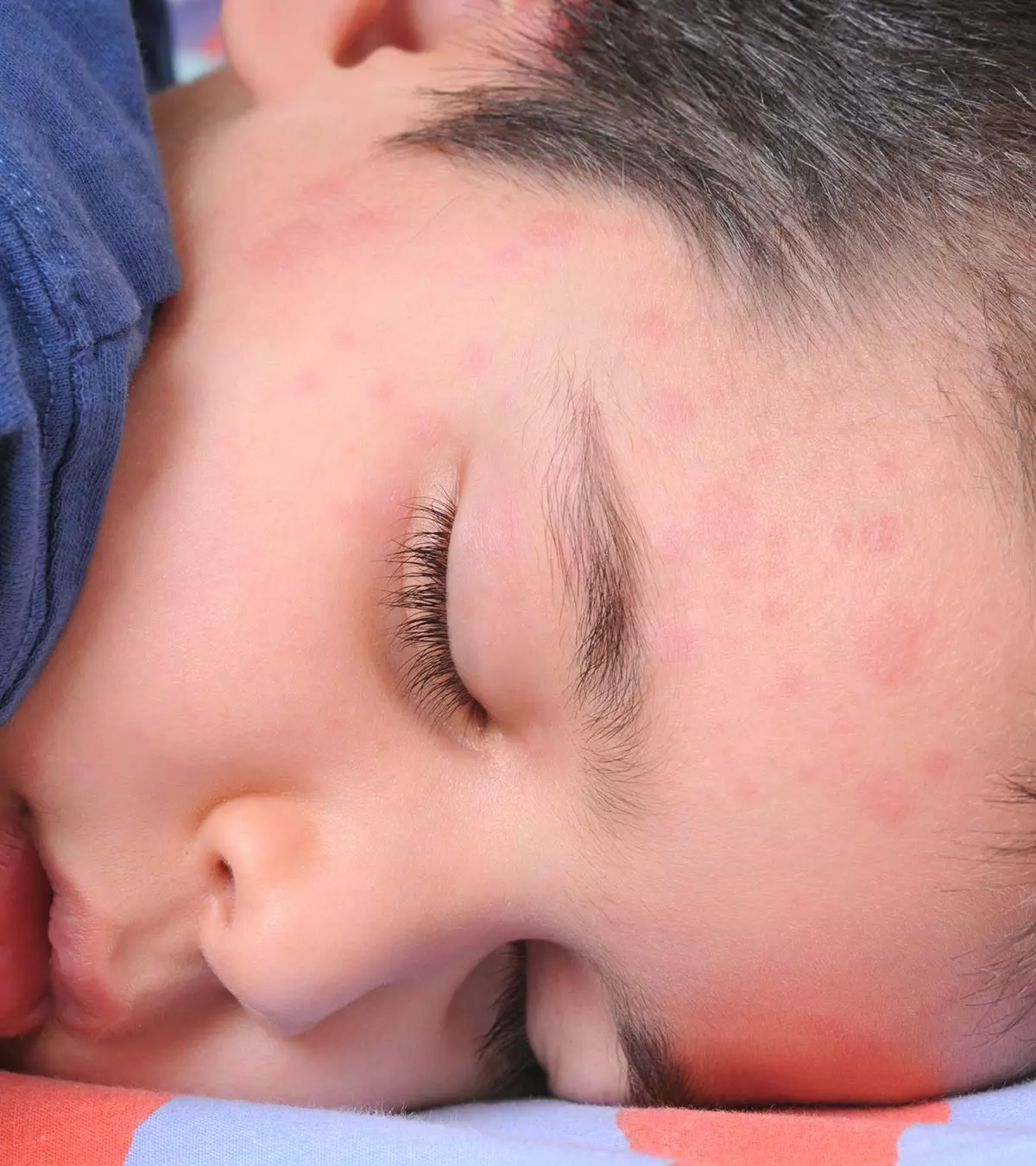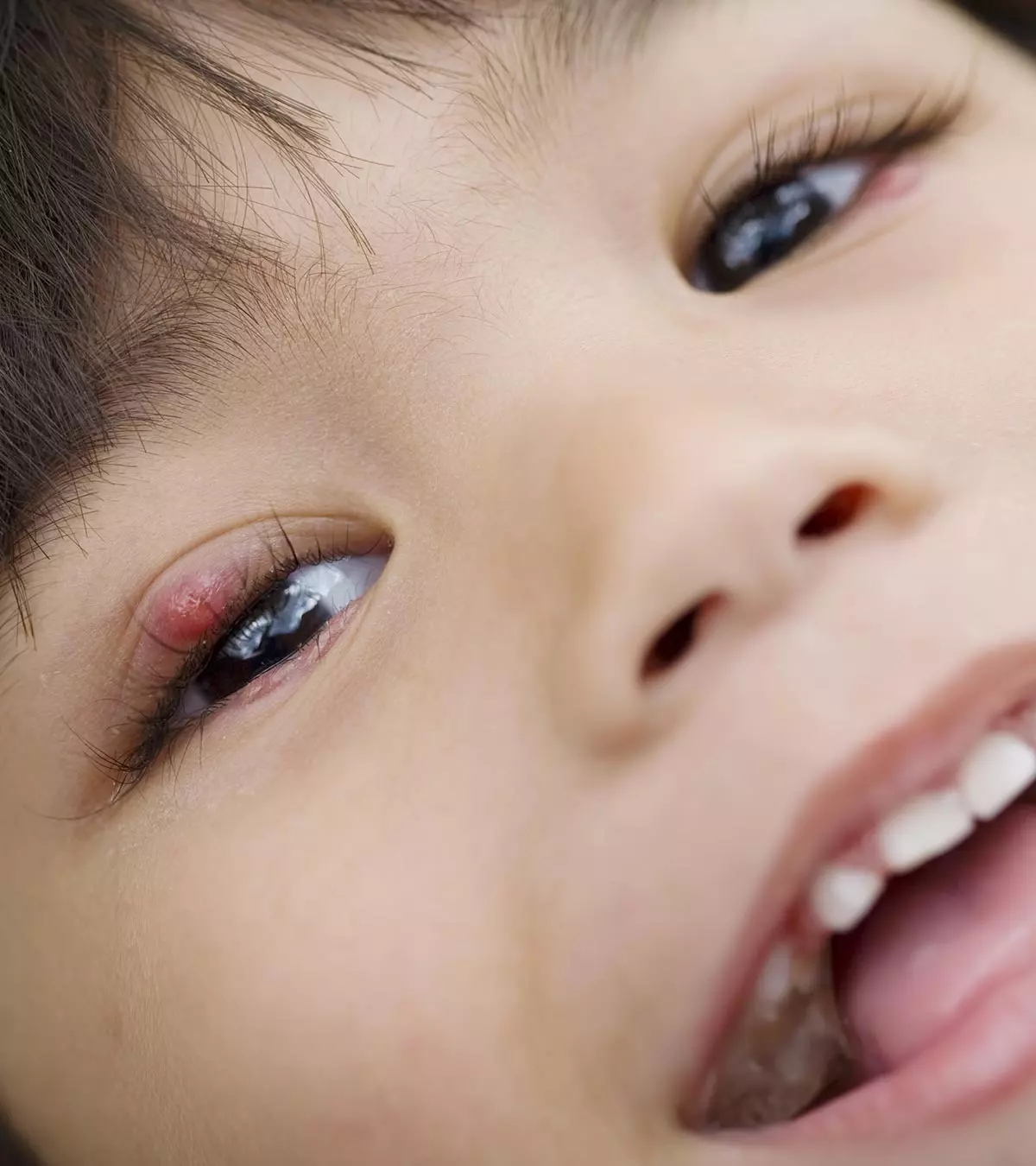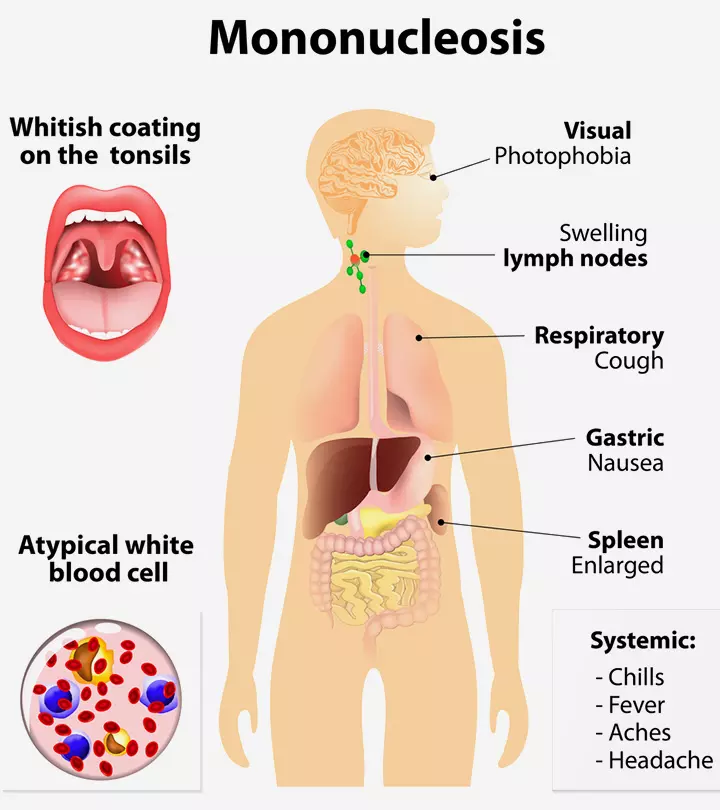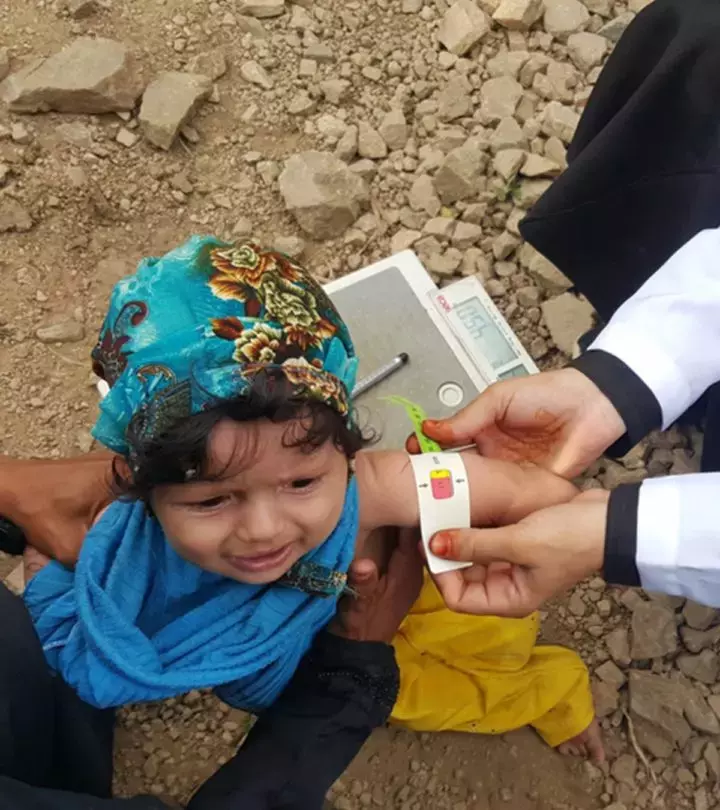
Image: Shutterstock
There are times when a mother may notice that her newborn won’t sleep unless held. While some babies like being held to sleep sometimes, others may not sleep at all without being held. Being held by the mother provides a feeling similar to that in the womb; the baby can feel your heartbeat and the familiar scent. However, holding the baby to sleep may not always be possible and may even be unsafe.

Read this post to learn the reasons why the newborn won’t sleep unless held and the ways to encourage them to sleep in a crib or bassinet without you holding them.
Key Pointers
- Your infant may refuse to sleep on their own out of habit or because they are anxious or tired.
- Swaddle or pat your baby to sleep instead of holding them.
- Avoid feeding your baby before bedtime to avoid getting used to overnight feedings.
- A pacifier can also help relax your infant and reduce the risk of sudden infant death syndrome.
Reason Why Babies Only Sleep When Held
There may be several reasons your baby fights sleep or resists sleeping on their own, including:
- Moro reflex (startle reflex): It happens when the baby is startled by a loud sound or movement during deep sleep. The Moro reflex in babies causes them to extend their arms and legs and arch their backs while crying (1). Thus, while putting your sleeping baby in their crib, an unconscious or improper movement may evoke the startle reflex and require you to pacify them in your arms.

- Feeling exhausted: If your baby has tired themselves out completely, they may become fussy and irritated, leading to difficulties while putting them down to sleep. Further, they may fall asleep in your arms, causing fussiness when you try to place them in their crib.
- Habit: If your baby has had the habit of sleeping in your arms since birth and likes to cuddle up to you, this sleep association may cause them to resist sleeping alone.
Samson Sarratt, a father, shares his story about transitioning his baby boy into a crib. He explains, “It was during the seventh month that our parenting life hit its first little struggle, when we decided to move our baby into a crib and his own room. He still slept pretty well, but when he did wake, my wife often had to feed and hold him for longer periods of time on a recliner that we placed in his room. This sleeping situation also had the added difficulty of getting him into the crib without waking him, as he would not go back to sleep if woken during this exchange (i).” Then, the parents decided to do periodic checks on the baby to help him learn self-soothing and observed remarkable changes.
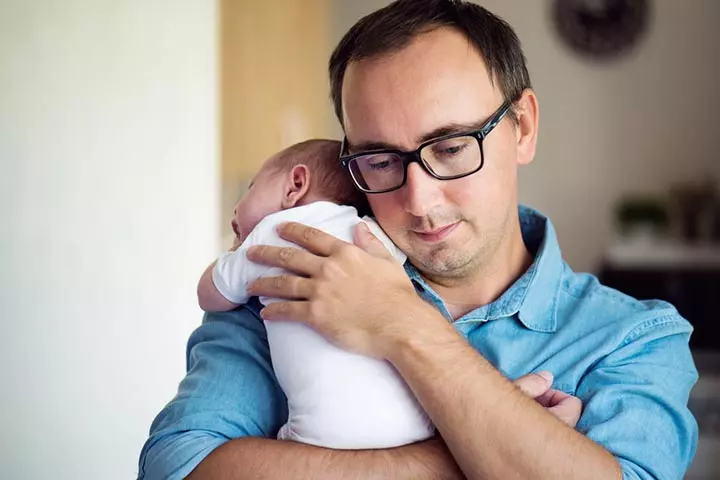
- Separation anxiety: Separation anxiety is commonly seen in babies between six months to three years (2). It causes babies to become anxious and show frustration when separated from their parents or caregivers, resulting in cranky and clingy behavior when they are put down to rest for a nap.
How To Put Your Baby To Sleep Without Holding Them
The safe sleep guidelines by the American Academy of Pediatrics (AAP) suggests room-sharing to reduce the risk of sudden infant death syndrome (SIDS) but does not recommend bed-sharing (3). So if your baby refuses to sleep by themselves or without being held, try the following approaches:
- Swaddle your baby: Swaddling is the practice of wrapping your baby in a blanket like a burrito and it is the best way to combat the Moro reflex. It resembles the snug environment inside the womb, thereby, it helps in soothing, pacifying, and calming the baby and promoting good sleep (4).
 Caution
Caution
- Keep your scent close: Before swaddling your baby, keep the swaddle blanket in close contact so that it catches your scent. Your lingering scent on the blanket may provide comfort and help your baby sleep better
- Use white noise: White noise combines various sound frequencies to help reduce the impact of loud noises in the surrounding environment (5). Introducing white noise with a white noise machine while the baby is sleeping helps prevent them from waking up due to surrounding sounds or Moro reflex.
- Hold your baby before putting them down: Before putting your baby down to sleep in their crib at night, hold them in your arms and rock them for about 15 to 20 minutes or until they are drowsy. Then, place them in the crib before they fall asleep. This will teach the baby to self-soothe and encourage them to fall asleep independently (6). You may gradually reduce the time you spend holding your baby before placing them in the crib. Stay nearby as they fall asleep, and slowly increase the distance over time.

- Avoid feeding your baby to sleep: Avoid feeding your baby to sleep to keep them from becoming used to such nighttime feedings, which may be difficult for you later. Instead, feed them shortly before putting them to bed (7).
Susan Yara, a mother of two, shares her experience regarding feeding and baby sleep training. She says, “One thing we had to teach him (her son) was to eat first. We would start feeding him thirty minutes before allowing him to finish his bottle. We would talk around him to ensure he was aware that while eating, he shouldn’t fall asleep (ii).”
 Point to consider
Point to consider- Soothe them without picking them up: If your baby becomes cranky after you put them down in their crib, avoid picking them up instantly. Instead, calm them by talking to them in a soft voice, singing them a lullaby, patting them, rubbing their tummy or their head, and reassuring them.
- Hold them in a wrap: Hold your newborn in a baby wrap or sling during their awake time to help develop your bond with them and promote skin-to-skin contact. Baby wearing also helps soothe the baby, keep the baby cozy, and reduce the chances of fussing while being put down to sleep (8).
- Offer a pacifier: Giving your baby a pacifier keeps them calm and reduces the chances of SIDS (3).
- Follow a routine: Create a relaxing bedtime routine for your baby. You may give them a bath, read them a story, or dim the lights to help them understand it’s time to sleep.
- Give them a massage: Infant massage may contribute to improved sleep quality and duration. This practice stimulates the release of oxytocin, a hormone associated with relaxation and bonding, promoting a sense of calm in infants. It also aids in relaxation by reducing stress. Research suggests that just 15 minutes of massaging your baby before sleep can make them sleep more deeply and soundly (9). This means that, over time, incorporating massage into a baby’s routine may help build self-soothing behaviors and improve the likelihood of restful sleep even when not held.
- Maintain ambient temperature: Babies often find comfort in being held due to the warmth and closeness they experience. By maintaining an optimal room temperature, a comfortable and sleep-inducing atmosphere can be created (6). If the room is too cold or too warm, it may disrupt the baby’s sleep and make them more likely to wake up or resist falling asleep. Parents may use a room temperature monitor to make real-time adjustments to create a soothing sleep environment, reducing the likelihood of the baby needing to be held to feel comfortable.
 Quick tip
Quick tipFrequently Asked Questions
1. Can you spoil a newborn by holding them while they sleep?
In the first few months of life, bad habits do not develop as babies cannot consciously connect cause and effect. Responding to their needs teaches babies to trust that you will address them, which helps them become secure and confident over time (10).
2. When should you stop holding your baby to sleep?
You may stop holding your baby to sleep once they are six months old. You may introduce a bedtime routine at the same time, such as bathing them, putting on pajamas, cuddling and feeding, and then going to bed (11).
3. How long should I let my newborn cry before picking them up to soothe them?
There is no set time limit, but if your baby cries when put down, try waiting around two minutes before responding to reassure them that they are secure and well-cared for. You can stand by their crib and try to comfort them before you lift them. Watch your baby’s expressions, trust your instincts, and create a supportive environment that suits your baby’s requirements (12) (13).
4. What are the risks of letting my newborn sleep on their stomach while being held?
It is not recommended to place a newborn to sleep on their stomach while being held, or even otherwise, as it increases the risk of sudden infant death syndrome (SIDS) (14).
5. How can I swaddle my baby correctly to promote better sleep?
Dr. Kevin Huffman, a board-certified bariatric physician from Vermilion, Ohio, advises, “Swaddle your child in a way that mimics the safety and security of being held. Gently rock or pat your baby as you place them in the crib before they fall asleep. Allow them to practice learning how to self-soothe and fall asleep on their own gradually.”
Newborns won’t sleep unless held is a common issue experienced by many new parents. Newborns prefer to snuggle with their mother since skin-to-skin contact can give them more secure feelings and calm them. Holding hands could help them experience the womb’s environment, and often demands to be held until they fall asleep out of sheer exhaustion. This behavior may change gradually when the baby adjusts to the new surroundings. However, constantly holding them in hands is not advised as they may not learn to sleep alone in a bassinet or crib. Sleep training and bedtime routine can help the baby learn to sleep independently.
Infographic: Getting Your Baby To Sleep Without Having To Hold Them
Holding your baby until the time they are asleep can be a challenging experience for parents and caregivers. So, what should you do to ensure that your baby sleeps peacefully without you having to hold them throughout the process? The following infographic is the answer to this question. Check this infographic out to learn about a few tips that might help you put your baby to sleep more easily.
Some thing wrong with infographic shortcode. please verify shortcode syntax
Some thing wrong with illustration image shortcode. please verify shortcode syntax
Get important insights on why your baby won’t sleep without you holding them and tips to help them sleep on their own, in this video.
Personal Experience: Source
MomJunction articles include first-hand experiences to provide you with better insights through real-life narratives. Here are the sources of personal accounts referenced in this article.
i. Help! Why won’t my baby sleep? Maybe you should Ferber that Gerber.https://medium.com/@SamsonSarratt/help-why-wont-my-baby-sleep-maybe-you-should-ferber-that-gerber-9b114498a5a1ii. Sleep training tips: how I got my baby to sleep through the night | Susan Yara.
https://www.youtube.com/watch?v=cfv6K3RthWI&feature=youtu.be
References
- Newborn Reflexes.
https://www.stanfordchildrens.org/en/topic/default?id=newborn-reflexes-90-P02630 - How to manage your child’s separation anxiety.
https://www.unicef.org/parenting/child-care/managing-child-separation-anxiety - How to Keep Your Sleeping Baby Safe: AAP Policy Explained.
https://www.healthychildren.org/English/ages-stages/baby/sleep/Pages/A-Parents-Guide-to-Safe-Sleep.aspx - Swaddling: Is it Safe?
https://www.healthychildren.org/English/ages-stages/baby/diapers-clothing/Pages/Swaddling-Is-it-Safe.aspx - What Is White Noise?
https://www.sleepfoundation.org/noise-and-sleep/white-noise - Sleep in Infants (2–12 Months).
https://www.nationwidechildrens.org/specialties/sleep-disorder-center/sleep-in-infants - Bedtime habits for infants and children.
https://medlineplus.gov/ency/article/002392.htm - My Newborn Only Naps If He’s Being Held.
https://www.zerotothree.org/resource/my-newborn-only-naps-if-hes-being-held/ - Infant Massage: Benefits and Techniques.
https://www.lancastergeneralhealth.org/health-hub-home/motherhood/the-first-year/infant-massage-benefits-and-techniques - Can you spoil a baby?
https://raisingchildren.net.au/newborns/connecting-communicating/bonding/can-you-spoil-a-baby - Frequent Night Awakenings: Why Is My Baby Crying During Sleep?
https://www.childrenscolorado.org/just-ask-childrens/articles/baby-crying-sleep/ - Is it OK to let a baby cry?
https://www.nct.org.uk/information/baby-toddler/caring-for-your-baby-or-toddler/it-ok-let-baby-cry - Suitable for 0-3 months Newborn behaviour: an overview.
https://raisingchildren.net.au/newborns/behaviour/understanding-behaviour/newborn-behaviour - When Can Babies Start Sleeping on Their Stomachs?
https://www.sleepfoundation.org/baby-sleep/baby-sleeping-on-stomach#:~:text=Putting%20an%20infant%20under%201
Community Experiences
Join the conversation and become a part of our nurturing community! Share your stories, experiences, and insights to connect with fellow parents.
Read full bio of Emily Lau
- Dr. Kevin Huffman is a doctor of osteopathic medicine and a board-certified bariatric physician. He is the founder of AmBari Nutrition, a platform for weight loss and dieting products. Dr. Huffman has treated more than 10,000 patients over three decades and is the founder & president of the American Bariatric Consultants.
 Dr. Kevin Huffman is a doctor of osteopathic medicine and a board-certified bariatric physician. He is the founder of AmBari Nutrition, a platform for weight loss and dieting products. Dr. Huffman has treated more than 10,000 patients over three decades and is the founder & president of the American Bariatric Consultants.
Dr. Kevin Huffman is a doctor of osteopathic medicine and a board-certified bariatric physician. He is the founder of AmBari Nutrition, a platform for weight loss and dieting products. Dr. Huffman has treated more than 10,000 patients over three decades and is the founder & president of the American Bariatric Consultants.
Read full bio of Sanjana Bhattacharjee
Read full bio of Rohit Garoo
Read full bio of Vidya Tadapatri







